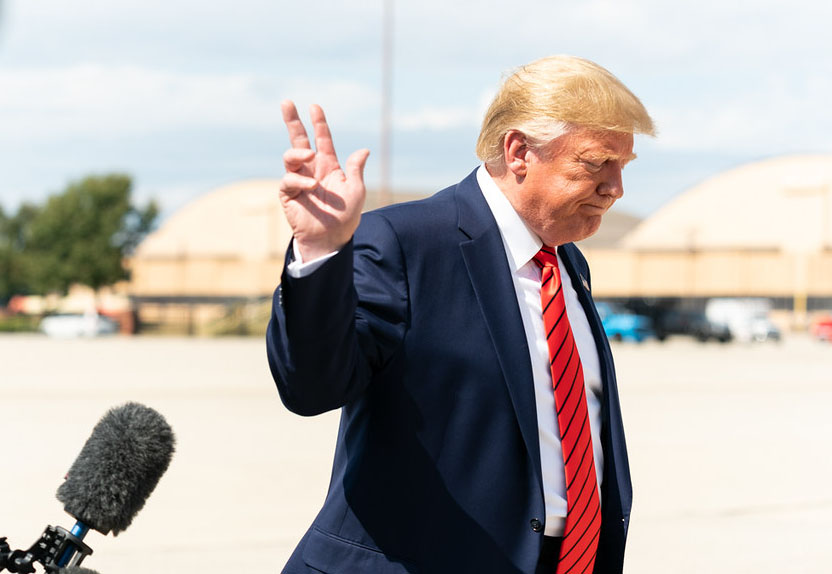
Published 26/11/2024 14:32 | Edited 11/26/2024 14:42
This Monday morning (25), Donald Trump, president-elect of the United States, reignited global trade tensions by announcing broad tariffs on imports from Mexico, Canada and China. In a post on his social network, Truth Social, Trump promised to implement the new fees on the first day of his new term, on January 20, 2025, justifying the measure as an effort to combat illegal immigration and drug trafficking.
“It’s time for them to pay a heavy price,” says Trump. He adds that the tariff would remain in effect “until drugs, in particular fentanyl, and all illegal immigrants stop this invasion of our country.” He says representatives from China told him they would institute their maximum penalty, death, for any drug trafficker, “but unfortunately, they never did that, and drugs are entering our country, mainly through Mexico, at levels never before seen before.”
If implemented, these tariffs, which include 25% on all products from Mexico and Canada and an additional 10% on Chinese imports, could trigger a new wave of trade disputes. Instead of promoting the opening of markets, the Republican returns to protectionism that contradicts the liberal ideal often promoted by the US as the basis of global trade. Countries that activate protectionist trade measures often use artificial allegations, as in the case of France, in which they criticize the Brazilian health system to prevent the meat trade.
Another trade war with China, along with promised tax cuts, reignites fears of runaway inflation in the US.
A selective liberalism
The United States presents itself to the world as the greatest defender of free trade. However, the policy announced by Trump exposes the duplicity of this rhetoric: while demanding liberality from its trading partners, the US does not hesitate to impose tariff barriers to protect its own interests.
The hypocrisy of this protectionism becomes evident when the US, the largest global consumer of goods and services, calls for the unrestricted opening of foreign markets, but resorts to punitive tariffs whenever it sees fit. This stance contrasts with the commitments made in agreements such as the US-Mexico-Canada Treaty (USMCA), which promise stability and predictability to trade relations in the region.
Economic and geopolitical impacts
Trump’s threats generated strong reactions. China called the move a counterproductive escalation, while leaders in Mexico and Canada warned of the potential economic impact on their economies, which are highly dependent on trade with the US.
The spokesperson for the Chinese embassy in the US, Liu Pengyu, reacted to Trump’s posts by stating on his profile on the social network X that “there is no winner in a tariff war or a trade war. Nor will the world benefit from it.”
These tariffs also risk undermining confidence in the multilateral trading system, already shaken by the tariff wars of Trump’s first term (2017–2021). Furthermore, by forcing trading partners to “pay a price”, the US ignores the mutual benefits of trade and threatens to push the world into recession, as the International Monetary Fund (IMF) has warned.
The contradictions of a leader
Trump’s rhetoric seeks to justify the tariffs as a response to the immigration crisis and drug trafficking. However, experts point out that trade policy is an inadequate tool for dealing with these issues. “The escalation of trade retaliation will only hurt people’s pocketbooks and is far from solving the underlying problems,” said Ricardo Monreal, leader of Mexico’s Lower House.
Furthermore, the logic of protectionism contrasts with the free market principles defended by the Republican Party, historically associated with liberal policies. The proposed tariffs also reveal a simplistic, short-term approach that prioritizes domestic political objectives over global economic stability.
The American Paradox
Trump’s proposal illustrates a paradox: the United States, which calls itself the “Wild West of the free market,” is often the first to raise it to protect its commercial borders. This practice destabilizes the economies of partners who have historically relied on the predictability of trade relations with the US.
Protectionism, disguised as national defense, only exposes the contradictions of an economy that demands openness while closing its doors. What the world really faces is not an “America first,” but an America that seeks to be the one to win, even at the expense of its partners and the global economy.
This approach leaves a resounding question for the world: does the “free trade” advocated by the US exist only when it is convenient for them? Knowing this in advance, countries like Brazil set an example by seeking to reduce their dependence on the USA by establishing solid partnerships with Mercosur, the European Union, Arab countries and China, always expanding the portfolio of players global.
Source: vermelho.org.br

